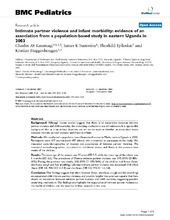Intimate partner violence and infant morbidity: evidence of an association from a population-based study in eastern Uganda in 2003
Peer reviewed, Journal article
Permanent lenke
https://hdl.handle.net/1956/2672Utgivelsesdato
2007-11-07Metadata
Vis full innførselSamlinger
Originalversjon
https://doi.org/10.1186/1471-2431-7-34Sammendrag
Background: Although recent studies suggest that there is an association between intimate partner violence and child mortality, the underlying mechanisms are still unknown. It is against this background that as a secondary objective, we set out to explore whether an association exists between intimate partner violence and illness in infants. Methods: We conducted a population based household survey in Mbale, eastern Uganda in 2003. Participants were 457 women (with 457 infants) who consented to participate in the study. We measured socio-demographics of women and occurrence of intimate partner violence. We measured socio-demographics, immunization, nutritional status, and illness in the previous two weeks of the children. Results: The mean age of the women was 25 years (SD 5.7) while the mean age of the infants was 6 months (SD 3.5). The prevalence of lifetime intimate partner violence was 54% (95% CI 48%– 60%). During the previous two weeks, 50% (95% CI 50%–54%) of the children had illness (fever, diarrhoea, cough and fast breathing). Lifetime intimate partner violence was associated with infant illness (OR 1.8, 95% CI 1.2–2.8) and diarrhoea (OR 2.0, 95% CI 1.2–3.4). Conclusion: Our findings suggest that infant illnesses (fever, diarrhoea, cough and fast breathing) are associated with intimate partner violence, and provide insights into previous reports that have shown an association between intimate partner violence and child mortality, suggesting possible underlying mechanisms. Our findings also highlight the importance of intimate partner violence on the health of children, and the need for further research in this area.
